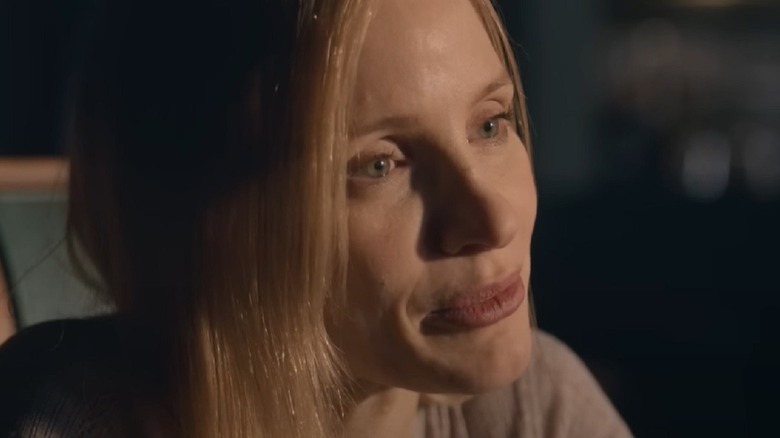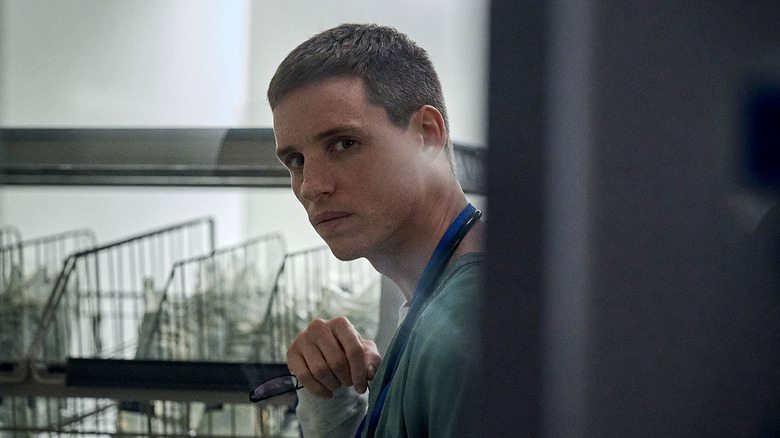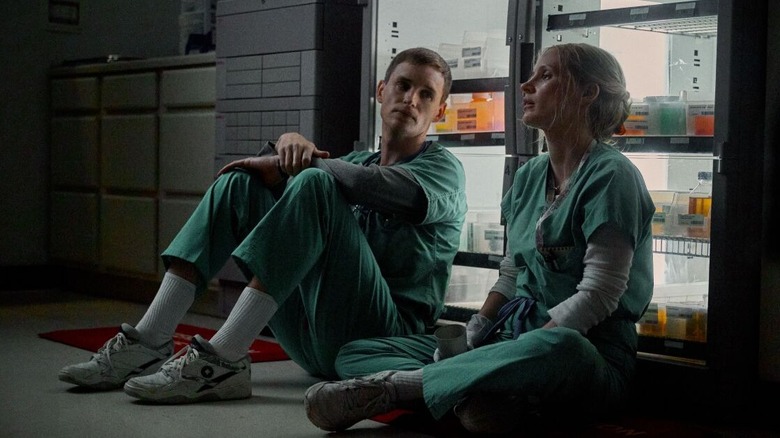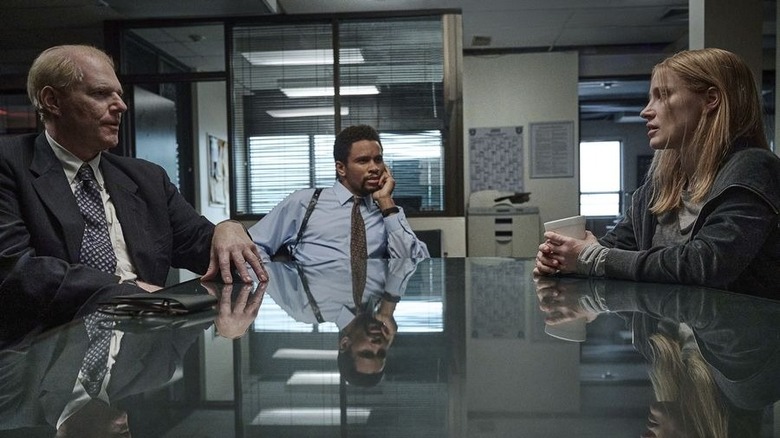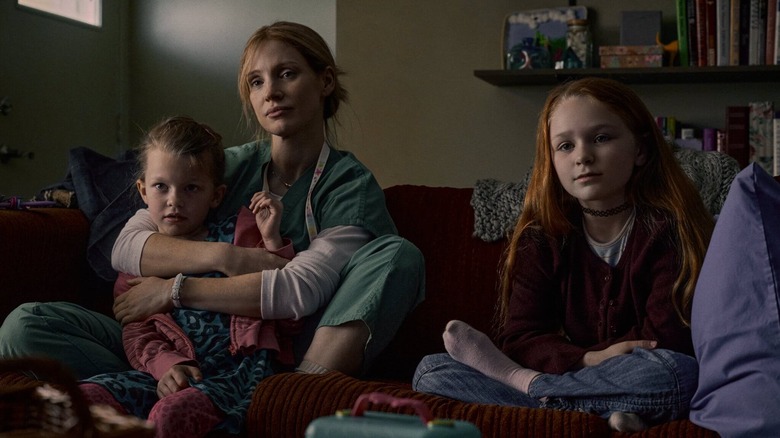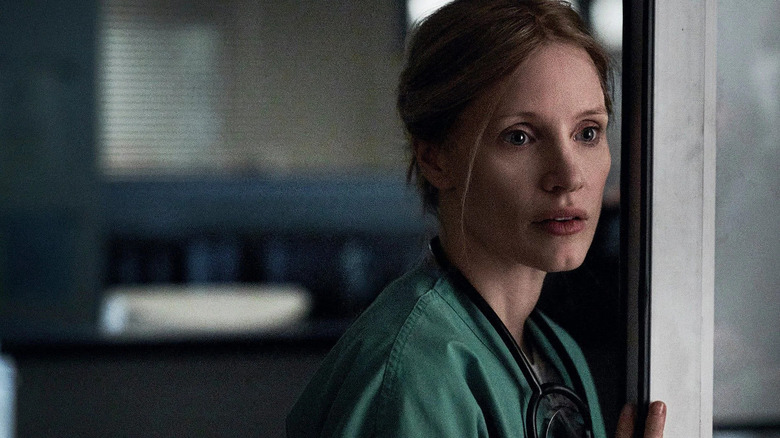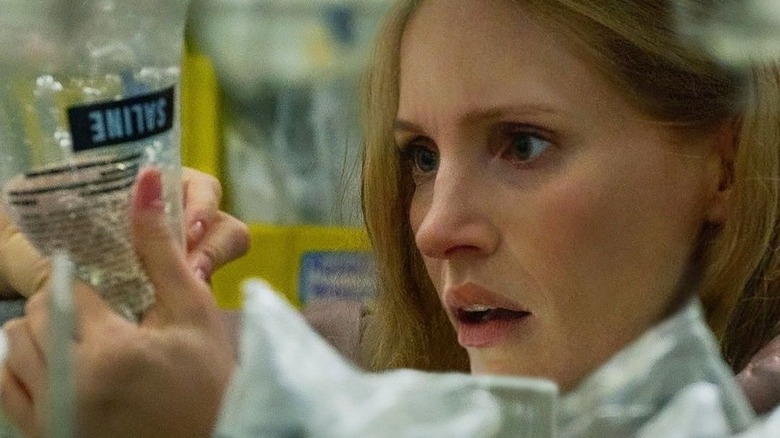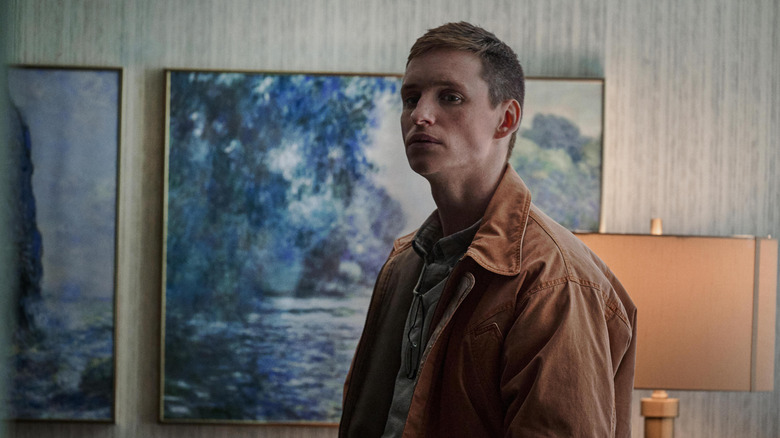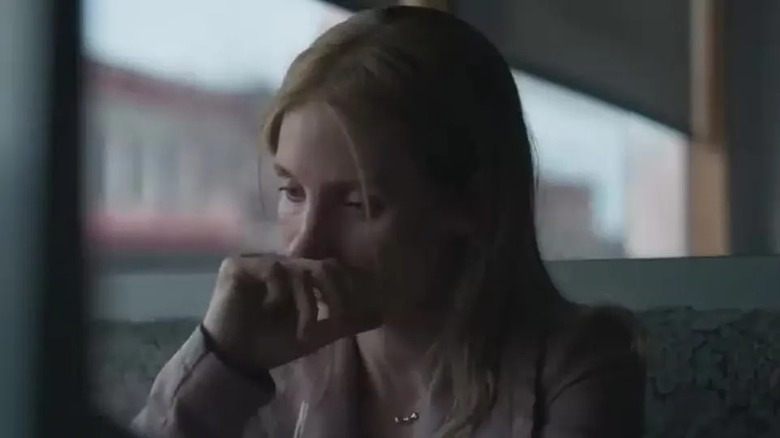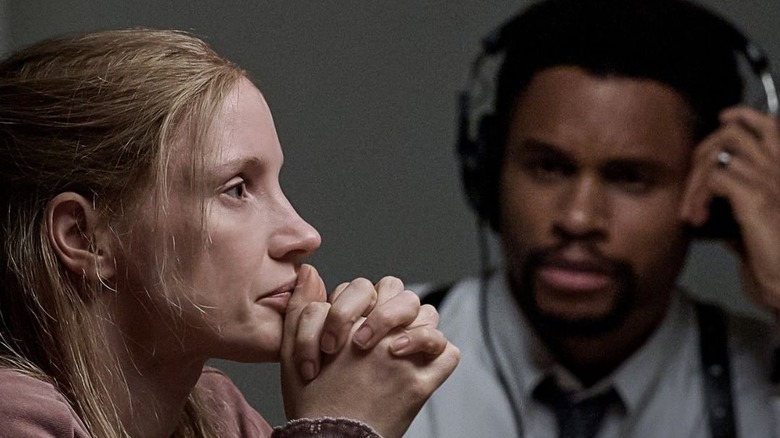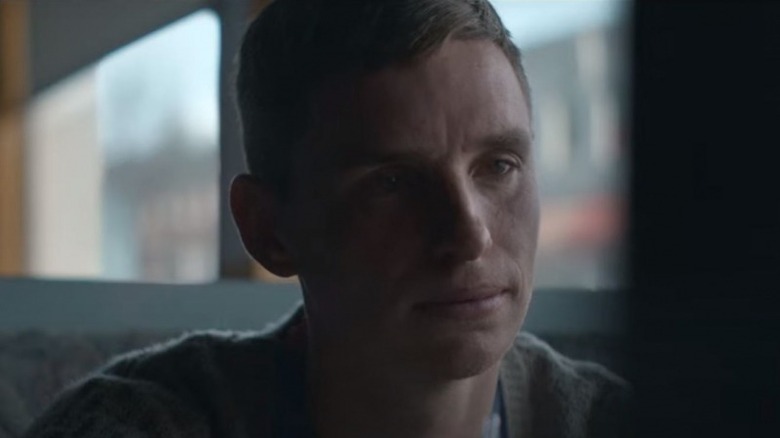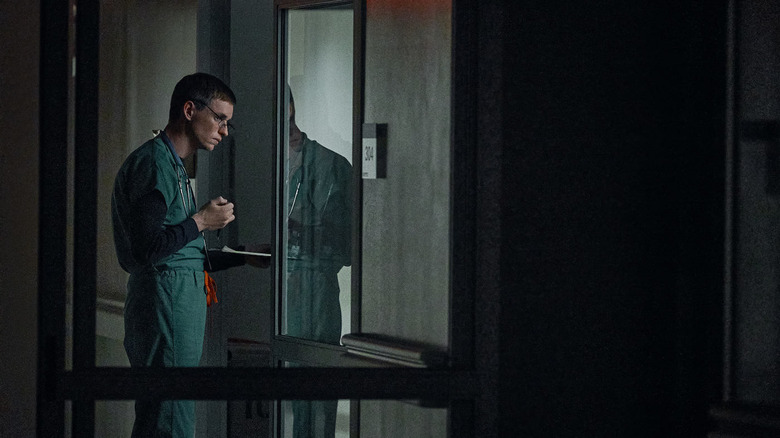The Ending Of The Good Nurse Explained
"The Good Nurse," which is now streaming on Netflix, is both another dose of the ongoing true crime trend and, in its own subtle ways, an antidote to it. The film is based on real-world events covered in the 2013 book, "The Good Nurse: a True Story of Medicine, Madness, and Murder" by Charles Graeber." The tale the book tells is of one of the world's most prolific serial killers, so audiences can understand why filmmakers were eager to bring it to life on screen. However, "The Good Nurse" avoids most of the tropes of the ever-popular genre. The body count is high, but the level of mystery, gratuitous violence, and amateur psychologizing are quite low. Instead, this thoughtful — but still tense — film chooses to focus on the struggle and the bravery of the woman who brought him to justice as well as the culpability of America's health care system.
There's never really much doubt about the identity of the killer. "The Good Nurse" signals to us in the pre-credits sequence that it's Charlie Cullen, played by an understated yet off-putting Eddie Redmayne. His fellow nurse and fast friend is Amy Loughren, stoically but gently portrayed by Jessica Chastain. The case against Charlie is pretty cut and dry in hindsight, so the drama comes entirely from waiting for Amy, our point-of-view character, to discover the awful truth. Along the way, the film — which takes place over five months — makes references to the book's more thorough 16 years of reporting. This is how Charlie's killing spree finally came to an end and where it leaves its hero and his victims.
Charlie Cullen's hospital hopping should've been a red flag
"The Good Nurse" begins in Eastern Pennsylvania's St. Aloysius Hospital in 1996. The character played by Redmayne stands back while a patient (all we can see is their feet) convulses and crashes. A team of doctors rushes in to save the person, to no avail. After the opening credits, a title card tells us that we're in Parkfield Hospital, New Jersey, and the year is 2003. An overworked Amy is told by her supervisor that they're getting her some help... someone with "tons of experience" and "great recommendations." That someone turns out to be Charles Cullen. When Amy asks him where he worked before, he says "all over." He rattles off some names: Florians, Vance, Shawlands, and St. Aloysius (they've been changed for the movie). Amy mentions she has a connection at Shawlands, and Charlie appears worried for a moment.
Later, detectives Braun and Baldwin will point out how strange it is that nobody was ever suspicious of Charlie's near-constant transfers (of course there's a reason: corruption). In total, he was employed by nine hospitals before he was caught. But because he was always let go for trivial reasons, he's able to keep finding jobs and keep tampering with IV bags. Parkfield, for example, fires him (officially) because he misrepresented the dates of his employment history. In that very meeting, he says co-workers at another facility "targeted" him. He tells Amy he had to move because of his divorce and custody hearings. Charlie can keep rationalizing that the world is against him because no one takes the obvious red flag that is his résumé seriously.
He earns Amy's trust by breaking the rules for good
We might suspect Charlie is a creep and a killer early on, but Amy's just happy to have help and a friend. The health care system is painted as one of the villains in "The Good Nurse" not just because it was complicit in covering up Charlie's crimes, but also because American for-profit medicine means corners get cut and a nurse can't afford coverage. The film shows Amy bending the rules for the greater good. She's admonished for letting Mr. Martinez sleep in a chair so that he can stay with his scared wife, Ana, overnight, and she's also attempting to keep the Martinez's insurance from ripping them off. Amy's also hiding her own serious condition, cardiomyopathy, so she won't lose her job before her insurance and paid leave kick in.
This single mom is hanging on by a shoestring. She struggles to pay the babysitter her kids don't like, and every time she gets stressed (which is always), she's at risk of a stroke. Charlie inserts himself into Amy's life by becoming her support system. He rehearses lines for the school play with her older daughter, Alex. He tends to patients when she needs a break. He takes her to her cardiology appointments. Crucially, while Amy will bend the rules, she won't break them. But Charlie will, for her. When her heart rate goes too high, he uses a flaw in the computer system to steal the medication she needs. Though Charlie is about to start killing again, he also finds purpose in (and one could argue, becomes obsessed with) taking care of Amy. He earns her trust, in part because of his fixation on her and in part to protect himself.
Detectives realize they're being stonewalled by the hospital board
After Ana Martinez "expires" as hospital bureaucrat Linda Garran terms it, Parkfield contacts police about her death, and Detectives Braun and Baldwin are assigned the case. In their first meeting with Garran, hospital lawyers, and a local politician, Braun and Baldwin are confused as to their role. Hospital reps act as if they're being thorough, but they're really hoping for this to be swept under the rug. However, the detectives intend to get to the bottom of the mystery. They're surprised to learn Mrs. Martinez died seven weeks ago and that her body has been cremated. That authorities weren't contacted sooner is the first sign of a coverup.
They discover that one of the nurses, Cullen, had a criminal complaint filed against him. When they make an inquiry, they learn charges were dropped, but there's a note stuck to his file with the word "digoxin" on it. They only realize Ana died by insulin overdose because Garran happens to leave the room, momentarily freeing them to show Amy the list of meds she'd been given, which was technically off-limits for questioning. Amy identifies the double medication error, which she says is extremely rare.
Braun and Baldwin have to pressure Garran to produce the records of their internal investigation, and when it comes, it's not the boxes full of paperwork Baldwin expects but a single folder. Strongly suspecting Cullen, Braun calls former employers, none of whom will talk once they hear his name. When Amy confirms that PYXIS keeps receipts of all medication withdraws (detectives have only been given page nine), Braun and Baldwin are certain the hospitals are purposefully hiding the truth.
Amy picks up on clues that Charlie might be dangerous
Amy is extremely welcoming and friendly when she first meets Charlie. She lets her professional guard down quickly, sharing details about her personal life and bringing him home to meet her kids. Still, as she spend more time with her colleague and new best bud, she seems to clock some things from his past that just don't sound right. Though they're filtered through the perspective of someone who sees himself as the victim, all of Charlie's odd statements are, in retrospect, clear proof that he's an abuser.
In one of their first heart-to-heart conversations, he complains to Amy that his ex-wife moved six hours away and that she's constantly finding excuses not to let him see his girls. On one occasion, he vents exasperatedly about how she's making up stories in which he was "mean" to her dog. Later, that story evolves and he claims she's accusing him of poisoning the dog. Even the way Charlie knows how to game the PYXIS system by canceling prescription drug orders just before the drawer opens sets off an alarm in her head, though she's not in a position to refuse the meds when they're for her. Though they'd gotten incredibly close, Charlie's behavior was noteworthy enough that when detectives approach her a second time about her fellow nurse and warn that he might not be who he says he is, she's at least able to entertain their suspicions.
The death of a second patient leads to an autopsy
The long, slow process by which Amy comes to understand that Charlie is a killer is the main source of thrills in "The Good Nurse." After she deduces the manner of Ana Martinez's death, she's alarmed to see that another patient — Kelly Anderson — also has insulin in her system. The new mother seems to be there because of an accident; she's wearing a neck brace and appears to have internal and superficial injuries. After her husband goes home with their baby, Kelly is disoriented and unable to grip Amy's hand. That's when the nurse spots the same double medication error on her chart. Again, doctors are paged to revive her and Amy calls Kelly's husband to hurry back, but the young woman passes away before he can get there. As he weeps, Amy holds the couple's crying baby and looks at Charlie with uneasiness. It's unclear if Charlie knows that Amy knows how Ava Martinez really died.
Amy unintentionally alerts detectives to Kelly's death when they come asking about Ana's. Braun and Baldwin finally have what they need to move forward with their case against Cullen: a body. Her husband has already buried her, but he consents to the police exhuming the coffin. "The Good Nurse" shows restraint and doesn't include a scene in which Kelly's body is subjected to an autopsy, but the autopsy report reveals — as they'd suspected — high levels of insulin and digoxin. This isn't enough evidence to charge Charlie yet, but it is enough evidence for Amy to begin to side with Braun and Baldwin and distance herself from her friend.
Amy follows up with an old friend and is convinced Charlie's the killer
Thankfully, Amy remembers that she and Charlie have a mutual acquaintance: Lori Lucas. Amy meets Lori for drinks and after exchanging some pleasantries, she says she wants to talk about something "weird." She asks if Lori remembers Charlie Cullen, and the mood changes. "There was a rumor about him, that he was responsible for a death," Lori says in a tone of voice that's half afraid and half gossipy. Her story matches up exactly with what Amy has experienced. He was suspected of purposefully overdosing someone by pin-pricking a saline bag and contaminating it with insulin. More contaminated bags were discovered, but Lori says no one thought to blame Charlie until he left. While he was in her wing, there'd be emergencies every night, but once he was gone, there'd only be one a month.
Amy rushes back to Parkfield and inspects the saline bags. Sure enough, one has been tampered with. Fluid leaks from a pinprick. This is the point of no return as far as Amy is concerned. She's utterly convinced that Charlie is responsible. Not only does she begin actively cooperating with the investigation, but she also watches out for patients in the ICU by switching their saline bags after Charlie's done his rounds. Amy's night out with Lori is an important step in solving the case, but it also shows how he was able to get away with murder for so long. His actions were an open secret, but everyone — including Lori — chose not to involve themselves for fear of him and of losing their jobs.
Her heart problems put her in a truly terrifying situation
Amy's heart is basically a ticking time bomb. If she keeps working, she'll likely have a major cardiac event within months, but she also has to keep working for months to get health insurance and sick leave. This catch-22 becomes even direr once she's thrust into the middle of a murder investigation. After she sees proof in the form of the compromised saline bags, she presumably rushes up several flights of steps to tell someone. The physical and emotional stress takes its toll, and Amy collapses on the floor. When she wakes, she's attached to an IV bag and Charlie is hovering over what had been her unconscious body. For a murder mystery, "The Good Nurse" is practically bloodless and abstains from cheap scares, but this scene is pure, very real psychological horror.
Having no way to tell if her saline bag is one of the ones Charlie's poisoned, Amy rips the tubes from her arm and insists on leaving the hospital. However, she hasn't told anyone about Charlie yet, and her co-workers still assume they're on good terms. Charlie assumes as much, too, and assures nurses he'll get her home safely. On the way, he promises to continue taking care of her, which sounds increasingly like a threat. For her part, Amy just wants to get out of the car. He loses his job shortly after this incident, and Amy comes home to find that he's dismissed the babysitter and is caring for her kids. She holds it together long enough to get him out of the house, but it's clear at this point that her own family's well-being depends upon getting Charlie behind bars.
She wears a wire to catch his confession
Because Charlie's canceled prescription orders aren't the smoking gun she hoped they'd be, the detectives enlist Amy to elicit a confession. First, they record a phone call between her and Charlie. He wants to meet her at the park with her kids, but Baldwin directs her to invite him to lunch. We can tell they've hooked her up to a wire when she communicates with Braun and Baldwin from her booth in a diner as she waits for Charlie to arrive. They can hear her dangerously rapid heartbeat, and her quiet curses give away how petrified she really is.
He walks in casually and attempts some small talk, but Amy is anxious to get to the point. At first, she tries to seem loyal and goes on about how everyone is badmouthing him and probably badmouthing her, too. She tells him she stood up for him, but he says he doesn't want to talk about Parkfield. Amy presses the issue with a kind of intimacy designed to encourage him to talk. She says she could understand why he might do those things. The implication here is that he may have been conducting mercy killings. Though Amy doesn't believe this, it's a tactic to get him to confess. But it doesn't work. Charlie's reaction is the first of two indications of the extent of his violence and madness. He lashes out by slamming his hand on the table. Immediately after this outburst, he calmly tells Amy about his new custody agreement. She tries once more, but he leaves for his new job as if nothing unusual has happened.
Amy's the hero that nobody else could be
Detectives Braun and Baldwin have enough to arrest Charlie on his way to his new hospital, but not enough to charge him. They have 48 hours to get him to own up to his crimes, but both the good cop and bad cop routines only serve to make a cornered, unstable Charlie angry. He repeatedly screams that he "can't" tell the truth over and over again in a rage. When Baldwin breaks the news to Amy that he's about to go free, she offers to visit his holding cell herself.
Amy may have been a little naïve in the first half of "The Good Nurse," but she's unbelievably heroic in the second half as she continues to put herself in extraordinarily uncomfortable and potentially harmful situations to protect her family and his future patients. By tapping into the way she made Charlie feel good about himself and needed during their days of genuine friendship, she finally gets him to admit he "did it." He confesses to Kelly and Ana's deaths as well as a few more from previous jobs. When she asks why, he simply and coldly says that none of the hospitals stopped him. "The Good Nurse" goes out of its way to show that, while the detectives deserve praise for not going along with the coverup, they couldn't have gotten a guilty plea and conviction without Amy, her courage, or her intuition.
Why did Charlie do it?
"The Good Nurse" doesn't delve too deeply into the reasons Charles Cullen may have committed serial killings in such an anonymous, unusual way, but there are allusions to the book throughout that provide some insight. When Ana dies, Charlie offers to prepare the naked body while Amy goes off to talk to her husband. A difficult-to-watch sequence follows in which he takes too much pleasure in the idea that he's ended this woman's life. But prior to being left alone with Mrs. Martinez, Charlie tells Amy about a painful detail from his past. His father died when he was a baby, then his mother was killed in a car accident when he was a young teenager. The hospital lost the body for awhile, and once he was allowed to see her, he says she was uncovered, naked, and a "total mess." Charlie laments that's how he remembered her for the longest time.
Charlie also talks disparagingly about his ex-wife and former co-workers on several occasions. When Detective Braun is attempting to secure a confession, he asks Charlie if his victims were all women and if he did this because of his mother or ex-wife. The movie touches on his lifelong fascination with poison by bringing up the dog, but it doesn't tell the full story of the extent of Charlie's mental illness or criminal past. The serial killer who would come to be known as the Angel of Death dealt with depression and alcoholism and attempted suicide with substances on more than one occasion. He felt isolated from his family and peers and demonstrated a propensity to harm others, too, from a young age.
If you or anyone you know is having suicidal thoughts, please call the National Suicide Prevention Lifeline by dialing 988 or by calling 1-800-273-TALK (8255).
If you or anyone you know is struggling with addiction issues, help is available. Visit the Substance Abuse and Mental Health Services Administration website or contact SAMHSA's National Helpline at 1-800-662-HELP (4357).
Charlie was held accountable, but the hospitals weren't
As many based-on-a-true-story movies do, "The Good Nurse" ends with title cards that tell the rest of the story. Amy got her heart transplant and lives in Florida with her family, where she's still a practicing nurse. Charlie was given 18 consecutive life sentences, which means he's theoretically in New Jersey state prison until 2403. He took credit for 29 patient deaths in a plea deal, but as he tampered with bags and not specific people, experts estimate that the real number of victims might be as high as 400. He worked as a nurse for 16 years, and the title cards tell us that most of the hospitals were onto him. But, as Charlie says in the film, none stopped him.
Charlie is paying for his crimes, but no hospitals were made to pay for the wrongful deaths of patients at Charlie's hand. Though "The Good Nurse" comes down hard on the institutions for their culpability, they were never subject to criminal proceedings because of loopholes that they kept exploiting. Since criminal charges against Charlie were dropped, and since he was always let go for unrelated issues, every subsequent hospital could claim they had no way of knowing he was a risk. It's a legally permissible if flimsy excuse. Charlie was reprimanded or under investigation at several hospitals, but none of them wrote him a bad recommendation upon his termination or shared details with his subsequent employers. They allowed him to kill dozens — if not hundreds — of people because of their fear of being sued.
